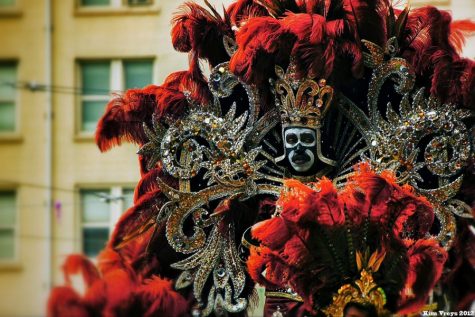Blackface’s history in Mardi Gras

From 1850 to 1870, the United States was a young nation, plagued by inequity and human rights violations. For the majority of that period, white Americans had the right to own human property: black slaves. Yet in the decades following the passing of the 13th Amendment – an abolishment of the privilege to own another human being – black Americans were not considered American by their white counterparts. In perpetuation of this belief system, this period saw the cultural rise of minstrel shows.
One of many ways white Americans sought to keep black Americans at the very bottom of society was through entertainment. Minstrel shows, in particular, exemplified the willingness of white people to uphold any and all anti-blackness. In minstrel shows, white actors donned the infamous blackface, pretending to be black people in ways that attempt to demonstrate how “stupid” and “lazy” they were, in accordance to negative stereotypes and racism that black Americans struggle against to this day.
In present times, blackface is now generally considered to be intolerable. Today, any resemblance of it gets consequently called out and the person who commits the action is held accountable for the anti-black act. As an example, artist Katy Perry recalled her new line of shoes earlier this month from stores as a result of the shoes’ uncanny caricature. Also earlier this month, fashion house Gucci released a jumper that closely resembled blackface, receiving criticism on social media almost immediately after. Gucci removed the product online and in stores and issued an apology.
Now, residents of New Orleans are facing a debate relative to the city’s famed carnival celebration of Mardi Gras.
Zulu was originally created as a Mardi Gras krewe by black New Orleanians, for black New Orleanians. Prior to its founding, only white people could join Mardi Gras krewes, and krewes purposefully did not throw beads or other items to black parade-goers.
Zulu’s tradition of members wearing blackface-esque makeup dates back to its origins 110 years ago, when the krewe leaders thought the act would mock white Southerners’ unreasonable stereotypes against black people whilst paying tribute to the krewes’ namesake: the Zulu culture of Africa. Zulu viewed this satirical use of black makeup important enough that it passed a mandate stating all members must wear it for the parades, even white members. This mandate is in effect to this day.
Present-day New Orleanians aren’t the first to question Zulu’s practice. In the 1960s, civil rights activists called for the boycotting of the krewe, accusing Zulu’s use of blackface to be offensive to black people and culture. The boycott was brief but very successful, so much so that Zulu’s membership crashed to only 15 individuals.
In the present day, it seems like history may be repeating itself.
“Zulu parade costumes bear no resemblance to the costumes worn by ‘blackface’ minstrel performers at the turn of the century,” according to a Zulu press release. “Most importantly, the history of Zulu makes it abundantly clear that nothing about the organization, including the black makeup, was never intended to insult or degrade African-Americans. To the contrary, Zulu has always been about celebrating African and African-American culture, strength, and pride.”
Since this story is relatively new, New Orleans’ residents’ stance on the debate remains a question for the near future and for the festivities of this year’s Mardi Gras.
Your donation will support the student journalists of Tulane University. Your contribution will allow us to purchase equipment and cover our annual website hosting costs.



Geronimo Stilton • Mar 10, 2019 at 11:56 am
Really cool article!
Benjamin Link • Mar 10, 2019 at 11:37 am
As a native, I really haven’t heard any controversy at all. If there is one, please give examples. This is an almost all-black krewe with black leaders. I really doubt the intent is to degrade black people. You’re fishing for a story that isn’t there.
Lisa Levin • Feb 28, 2019 at 5:00 pm
A sentence should not end with the word “after” and there is a sentence with a double negative. This is a newspaper that represents a highly acclaimed academic institution. The grammar in this and all articles should be held to a higher standard.
Jack • Feb 28, 2019 at 12:37 pm
Abolishment isn’t a word bud. I think the word you were looking for is abolition. Great editing guys.